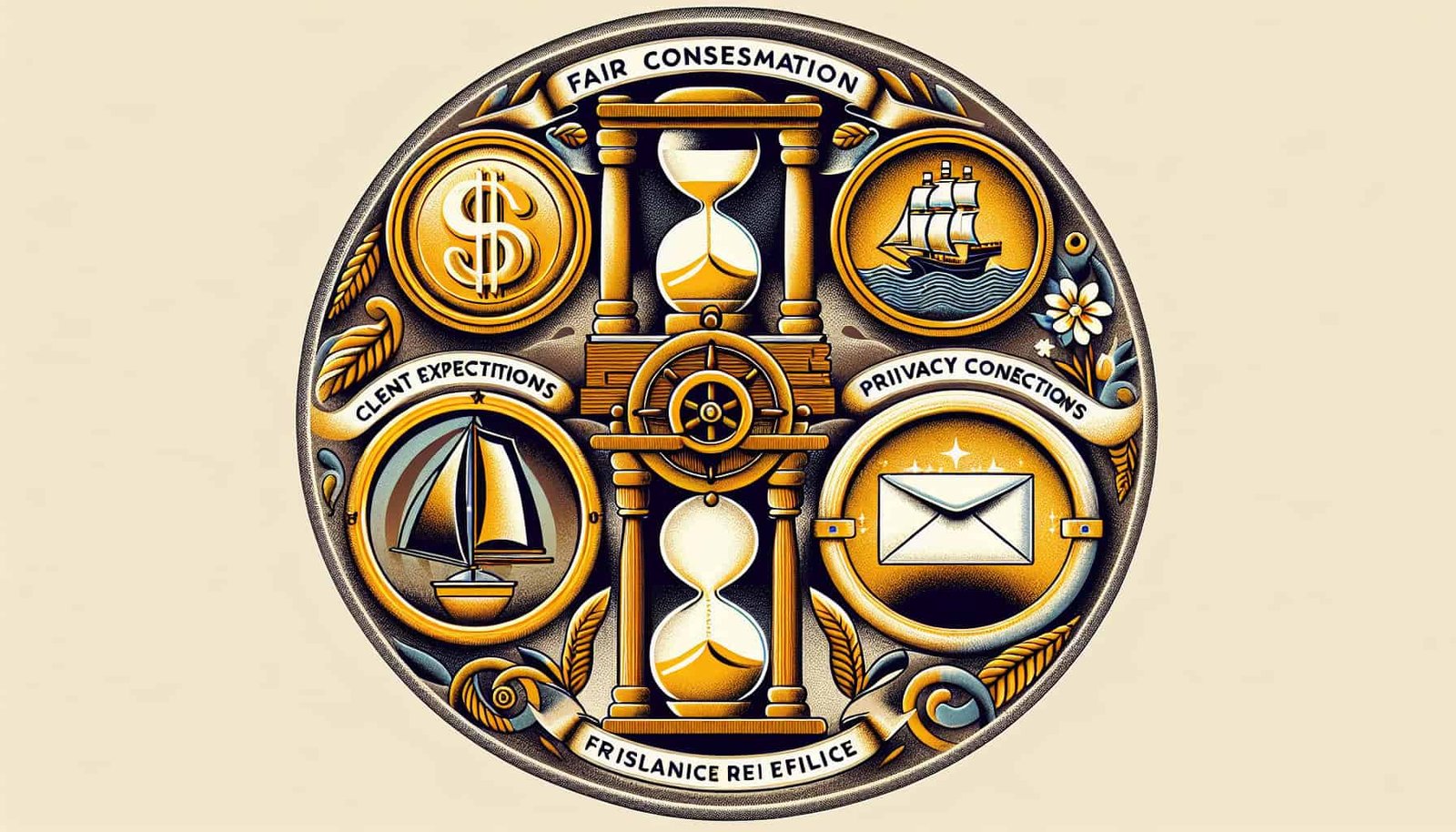In the ever-evolving landscape of freelance work, it is crucial to navigate the ethical considerations that come with being your own boss. As a freelancer, your actions and decisions have a direct impact on your clients, colleagues, and reputation. From maintaining confidentiality to managing conflicts of interest, understanding and upholding ethical standards is crucial for success and long-term sustainability. This article explores the key ethical considerations that freelancers must keep in mind, offering practical insights and guidance to ensure professionalism and integrity in their work. Whether you’re a seasoned freelancer or just starting out, this article will provide valuable tips to navigate the ethical complexities of the freelance world.

The Importance of Ethical Considerations for Freelancers
Freelancing has become increasingly popular in recent years, providing individuals with the flexibility to work on their own terms and choose their clients. However, with this newfound freedom comes the responsibility to uphold ethical standards in their work. Ethical considerations play a crucial role in defining the reputation and success of a freelancer. By understanding and practicing ethical behavior, freelancers can build trust, maintain strong client relationships, and ensure long-term success in their careers.
Understanding the Ethical Responsibilities of Freelancers
To maintain honesty and integrity in their work, freelancers must adhere to certain ethical responsibilities. Transparency is key when it comes to qualifications and abilities. It is essential for freelancers to be open and honest about their skillset and experience. By doing so, they can ensure that clients have realistic expectations and avoid misrepresentation.
Another crucial ethical aspect for freelancers is avoiding plagiarism and intellectual property infringement. It is imperative to respect others’ work and ideas by giving proper credit and obtaining necessary permissions when using copyrighted material. By doing so, freelancers can protect their own credibility and maintain a positive reputation.
Lastly, respecting client confidentiality is paramount. Freelancers must handle sensitive information provided by clients with the utmost care and maintain strict confidentiality. This includes safeguarding data, using secure storage and transmission practices, and adhering to data protection regulations.
Examining the Impact of Ethical Behavior on a Freelancer’s Reputation
Practicing ethical behavior has a profound impact on a freelancer’s reputation. When freelancers act with honesty and integrity, they gain the trust and respect of their clients. Word-of-mouth referrals and positive reviews are essential for freelancers, and ethical behavior is a surefire way to earn them.
Clients value freelancers who consistently meet deadlines and deliver high-quality work. By fulfilling these expectations, freelancers demonstrate their professionalism and reliability. This not only enhances their reputation but can also lead to long-term client relationships and opportunities for repeat business.
Furthermore, ethical behavior is a powerful tool against conflicts and conflicts of interest. By maintaining objectivity and impartiality, freelancers can avoid conflicts and ensure fair and equal treatment of all clients. This demonstrates professionalism and integrity, further strengthening their reputation in the freelance community.
Identifying the Potential Consequences of Unethical Practices for Freelancers
Unethical practices can have severe consequences for freelancers. Plagiarism and copyright infringement can lead to legal issues and damage a freelancer’s reputation irreparably. Clients value original work and will not hesitate to sever ties with freelancers who violate ethical standards.
Overcharging or undercharging clients can also have adverse effects. Overcharging may lead to strained relationships and a loss of future business opportunities, while undercharging can undercut the market and devalue the freelancer’s skills. Setting fair rates ensures a mutually beneficial and sustainable relationship, fostering trust and credibility with clients.
Failure to maintain professionalism and respect in client interactions can lead to strained relationships and loss of potential business. Poor communication, mishandling of feedback and criticism, and conflicts of interest can easily damage a freelancer’s reputation. Maintaining professionalism in all aspects of client interaction is vital for establishing credibility and fostering positive relationships.
Additionally, unethical behavior can result in legal ramifications. Failure to protect client data and sensitive information or non-compliance with data protection regulations can lead to legal penalties and reputational damage. Freelancers must prioritize data security and adhere to applicable laws and regulations to protect both their clients and themselves.

Maintaining Honesty and Integrity
Being transparent about qualifications and abilities is essential for freelancers. By clearly communicating their skills and areas of expertise, freelancers can manage client expectations and avoid misrepresentation. This transparency fosters trust and helps build solid client relationships based on mutual understanding.
Avoiding plagiarism and intellectual property infringement is a crucial ethical responsibility. Freelancers must ensure that all work is original and properly cited if referencing external sources. By respecting the work and ideas of others, freelancers uphold integrity and demonstrate their professionalism.
Respecting client confidentiality is equally vital. Freelancers should handle client information with the utmost care, ensuring it is not shared without explicit permission. By maintaining strict confidentiality, freelancers build trust and integrity, distinguishing themselves as reliable partners for their clients.
Fair Pricing and Payment Practices
Setting fair rates for services rendered is a fundamental aspect of ethical freelancing. Freelancers should consider the market value of their skills and experience and price their services accordingly. Fair rates also contribute to maintaining a competitive and sustainable freelance market.
Freelancers must avoid both overcharging and undercharging clients. Overcharging may lead to strained relationships and dissatisfied clients, while undercharging can undermine the perceived value of their services. By setting fair rates, freelancers can establish trust, ensure client satisfaction, and maintain long-term business relationships.
Establishing clear payment terms is equally important. Freelancers should clearly communicate their payment expectations to clients from the outset, including payment schedules and methods. This ensures transparency and avoids any misunderstandings or conflicts regarding payment, reaffirming the freelancer’s professionalism and commitment to ethical business practices.

Meeting Deadlines and Quality Expectations
Delivering work on time and as promised is critical to maintaining trust and credibility as a freelancer. Meeting deadlines demonstrates reliability and professionalism, ensuring that clients can rely on the freelancer to deliver their work when expected.
Maintaining a high standard of quality in deliverables is equally essential. Freelancers should strive to exceed client expectations and produce work of the utmost quality. This not only enhances the freelancer’s reputation but also increases the likelihood of positive reviews, referrals, and repeat business.
Seeking feedback and making necessary revisions is an integral part of ethical freelancing. Freelancers should actively engage with their clients, listen to their feedback, and implement necessary changes or improvements. This commitment to continuous improvement demonstrates professionalism and a dedication to client satisfaction.
Respecting Client Relationships
Communication is key to maintaining strong client relationships. Freelancers should be prompt and clear in their communication, ensuring that they address client inquiries and concerns in a timely manner. Effective and transparent communication fosters trust and avoids misunderstandings or conflicts.
Managing client expectations and boundaries is vital for maintaining healthy relationships. Freelancers should have open discussions with clients about project scope, deliverables, and timelines. By setting realistic expectations and boundaries, freelancers can avoid potential conflicts and ensure client satisfaction.
Freelancers must also prevent conflicts of interest or favoritism. This means treating all clients fairly and objectively, without showing preferential treatment to any specific client. By maintaining objectivity and avoiding conflicts of interest, freelancers can establish themselves as trustworthy partners for their clients.

Avoiding Plagiarism and Copyright Infringement
Originality is paramount in freelance work. To maintain ethical standards, freelancers should ensure that all work is their own and not copied from others. When referencing external sources, it is crucial to properly cite and attribute any borrowed material. By valuing originality, freelancers protect their reputation and demonstrate their professionalism.
Obtaining necessary permissions is essential when using copyrighted material. Freelancers must ensure that they have the legal right or permission to use any copyrighted content in their work. By respecting intellectual property rights, freelancers uphold ethical conduct and avoid potential legal consequences.
Using licensed resources and materials ensures that freelancers are not infringing upon copyrights or intellectual property rights. By using reliable and licensed resources, freelancers can guarantee the legality and integrity of their work, protecting both themselves and their clients.
Safeguarding Data and Information
Protecting client data and sensitive information is of utmost importance for freelancers. By implementing secure storage and transmission practices, freelancers can minimize the risk of unauthorized access or data breaches. This includes using encrypted communication channels and keeping client data on secure servers.
Adhering to data protection regulations is a legal and ethical responsibility for freelancers. Freelancers must familiarize themselves with applicable data protection laws and ensure compliance in all aspects of their work. By doing so, freelancers safeguard the privacy and trust of their clients, further strengthening their reputation.

Maintaining Professionalism in Client Interactions
Freelancers should approach all client interactions with respect and courtesy. Professionalism should be evident in all forms of communication, whether it be email, phone calls, or in-person meetings. By treating clients with respect, freelancers foster positive relationships and demonstrate their commitment to ethical business practices.
Handling disagreements and conflicts professionally is essential in maintaining client relationships. Freelancers should approach conflicts constructively, listening to all parties involved and seeking mutually beneficial resolutions. By handling conflicts with professionalism, freelancers can navigate challenging situations while preserving their reputation.
Managing feedback and criticism constructively is an integral part of ethical client interactions. Freelancers should welcome feedback, view it as an opportunity for growth, and address it in a positive and constructive manner. By demonstrating a willingness to improve, freelancers can strengthen their relationships with clients and continuously enhance their work.
Avoiding Conflicts of Interest
Freelancers must be aware of and address potential conflicts of interest. This includes disclosing any relevant affiliations or relationships that may impact their work or objectivity. By being transparent about potential conflicts, freelancers maintain trust and credibility with their clients.
Maintaining objectivity and impartiality is crucial for freelancers. They should base their decisions solely on professional judgment and avoid personal biases or favoritism. By prioritizing fairness and objectivity, freelancers ensure that all clients are treated equally and receive the same level of dedication and service.
Recognizing potential conflicts of interest requires introspection and self-awareness. Freelancers should be proactive in identifying any situations that may compromise their ability to provide unbiased services and take appropriate measures to address them. This demonstrates a commitment to ethical conduct and professionalism.
Ensuring Equality and Fairness in Freelancing
Promoting diversity and equal opportunities for freelancers is an ethical responsibility. Freelancers should support fair competition and ethical business practices by providing opportunities for freelancers from all backgrounds and ensuring equal consideration for all projects. This promotes a healthy and inclusive freelance ecosystem.
Freelancers must avoid discrimination based on gender, race, or any other factors. All clients should be treated fairly and without bias. By upholding principles of equality, freelancers contribute to a more equitable freelance industry and foster a culture of fairness and respect.
Supporting fair competition is essential for maintaining ethical standards in the freelance community. Freelancers should compete based on the quality of their work and the value they provide to clients, rather than resorting to unethical practices such as undercutting prices or spreading false information about competitors. By promoting fair competition, freelancers contribute to a more professional and reputable freelance industry.
In conclusion, ethical considerations are crucial for freelancers to maintain a positive reputation and succeed in their careers. By practicing honesty, integrity, and professionalism, freelancers can build trust with clients and establish themselves as reliable partners. Fair pricing, meeting deadlines and quality expectations, respecting client relationships, and avoiding conflicts of interest are all essential aspects of ethical freelancing. Furthermore, upholding copyright laws, safeguarding client data, and promoting equality and fairness contribute to a healthy and ethical freelance industry. In a competitive and ever-evolving market, ethical considerations set freelancers apart and ensure long-term success and satisfaction for both freelancers and their clients.

